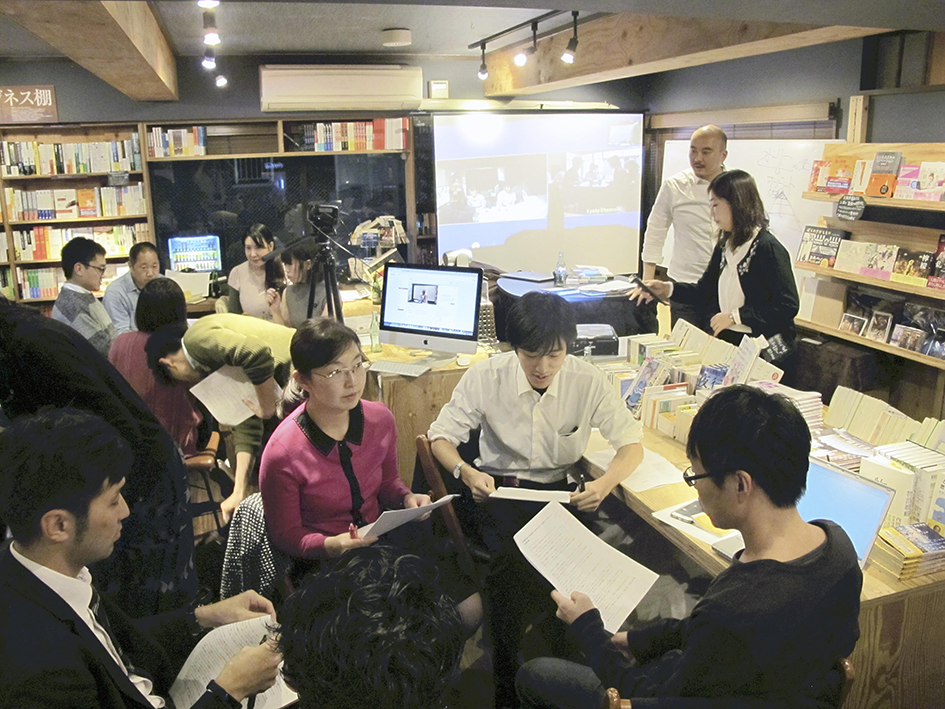Bookstores using innovation to survive
The bookstores are seeking to add new value to their conventional business style, in which they just buy books from wholesalers and sell them. Owners and managers are searching for ideas about how bookstores will operate in the future.
Experiences for sale
In early November, a lecture event for fostering writers was held in the Tenro-in Shoten bookstore, which is run by Takanori Miura, 40, in Ikebukuro, Tokyo. Participants packed the store, which occupies only about 40 square meters on the second floor of a multi-tenant building. Miura told participants: “To have people read your writing until the end, be conscious of how easy to read it is. If the work is hard to understand, a switch will activate in the readers’ minds to close the book.”
He talked about practical writing techniques such as using Japanese-style quotation marks at the opening of the work and placing eye-catching words in titles.“After joining my current company, I felt deeply how important writing skills are in introducing our properties via websites,” said Takumi Hayashi from Hachioji, Tokyo, who works for a real estate company. “The lecture is practical enough to understand, even for people who feel they’re not good at writing.”
Miura opened the Tenro-in store in the Ikebukuro area in 2013. He also manages bookstores in Kyoto and Fukuoka. Almost every week, the Ikebukuro store has held various events: lectures for fostering not only writers, but also photographers or novelists and also English conversation lessons. There are sometimes performances by drama troupes, the store also manages travel plans.
Miura said he thought, “People who come here to look for books won’t be satisfied just with finding the books they want.” He changed his mind-set to “I will sell the opportunity of experience.”“I want to devise ideas so visitors to my store can enjoy it in a variety of ways,” he said.Beer and book in hand
A bookstore called B&B in Shimokitazawa, Tokyo, has grown in popularity with the catchphrase: “A bookstore where you can drink beer.”B&B opened in 2012 — and its name is an abbreviation of “book and beer.”Late into the night, the bookstore is alive with people who enjoy beer and food while reading their favorite books.
The store does not rely on book wholesalers for its selection. In most cases, books sold at retail stores are selected by wholesale companies on the basis of past sale data. However, B&B’s staff select all the books they sell.It is impossible to have a wide range of books like those in large-scale bookstores, but B&B’s lineup includes publications that capture the interest of people who adore reading, such as handmade books and a pictorial book of fictitious insects.
One of the staff is Shintaro Uchinuma, 37, a book coordinator who selects books for bookstores and libraries. In the wake of the 2011 Great East Japan Earthquake, he heard people in the disaster-hit areas had visited local bookstores seeking information. “Bookstores are also essential as sources of information in local communities,” he thought.
He wanted B&B to serve as a model for other small and midsize bookstores. So B&B expanded its revenue sources — it began allowing not only drinking and dining at the store, but also held various events, including daily talks with writers.Uchinuma said: “When people are surrounded by a huge number of books, they’re blown away, thinking how much information exists in the world. Electronic books are convenient, but physical books have their own charms.”
Market for publications shrinking
The number of bookstores nationwide fell from 17,911 in fiscal 2006 to 14,098 in fiscal 2016, according to the Tokyo-based Japan Publishing Organization For Information Infrastructure Development (JPO), which is funded by organizations related to publishing. However, sales floor space has increased. The JPO believes this means that more and more small and midsize bookstores have closed.
The market for publications has been also shrinking. Estimated sales of paper publications in 2016 fell 3.4 percent from the year before to about ¥1.47 trillion, marking the 12th straight annual decrease, according to the Tokyo-based Research Institute for Publications. Ohraido Shoten, a bookstore based in Tokyo, became famous for grouping books according to themes and relations rather than according to author. “Bookstores’ profits in comparison with sales of books are small under the business structure,” said Tetsuya Ando, who was the first manager of Ohraido Shoten. “In addition to the rise of Amazon.com and other online bookstores, sales of magazines have been sluggish. As a result, small and midsize bookstores are especially struggling,” he said. He added, “In years of uncertainty, more and more people seek answers from books. The role of bookstores as guides is important. While struggling amid adverse winds, bookstores that can increase their fandom through their own endeavors will be the ones that survive.”
